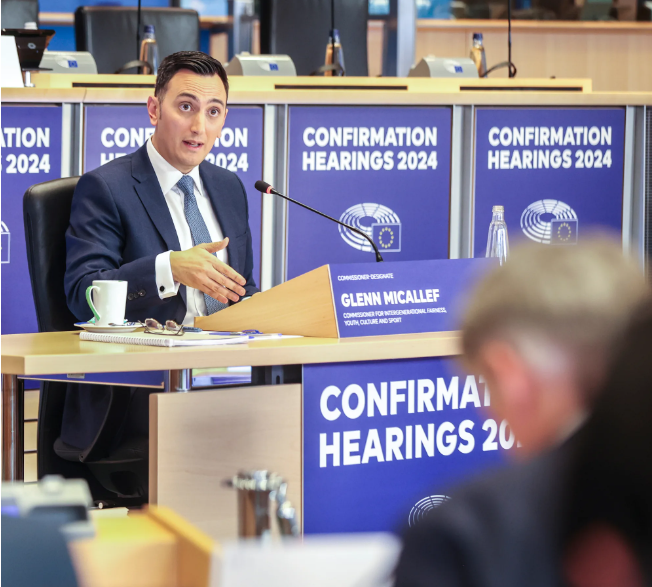By Culture Action Europe
On 4 November 2024, Glenn Micallef, Commissioner-designate for Intergenerational Fairness, Youth, Culture and Sport, faced a confirmation hearing before Members of the European Parliament.
To spare you the three-hour session, Culture Action Europe has distilled the hearing into nine main takeaways, focusing on the cultural aspect of Micallef’s portfolio.
Micallef played it safe, staying within the scope of his mission letter. He repeatedly referenced initiatives like the Cultural Compass but withheld specific details, leaving many questions unanswered and relying on more general statements about the importance of his portfolio. On the one hand, this approach allowed him to avoid explicit conflict and steer clear of commitments to different political parties. On the other hand, many MEPs were frustrated by the lack of concrete answers. It seems likely that Micallef will secure a place in the College of Commissioners but will need to demonstrate his influence in the decision-making process moving forward.
When in doubt, refer to values. Micallef sidestepped provocative questions from the far-right by affirming that values like equality, solidarity, democracy, and freedom are ‘non-negotiable.’
Much of the cultural action will be realised under the Culture Compass, which Micallef described as ‘a game-changer for the cultural sector.’ He outlined three main objectives for the Compass: 1) protecting culture and cultural heritage, 2) enhancing regional cohesion, and 3) boosting competitiveness and innovation in culture. Culture is currently present in 20 policy areas and 20 funding instruments, and Micallef wants ‘coordinated action, a vision, a strategy with means, with objectives, and with monitoring tools so that we can ensure that our sector is properly managed to deliver on our common objectives.’ The Compass will guide cultural integration across various policy areas, both within the EU and externally, and address topics like AI, working conditions in the cultural sector, and cultural diplomacy.
The standalone funding programme for culture remains uncertain. Micallef maintained that more scrutiny is needed to determine what should be funded and how. ‘We have to see how Union financing in the next mandate can be more strategic and more impactful to improve the working conditions of artists and to boost the competitiveness of our cultural and creative sector industries,’ he said. However, Micallef did commit to strengthening Erasmus+ ‘that is envied by global partners’, contrasting with his cautious stance on Creative Europe and the 2% Cultural Deal for Europe. Could this imply an inclination to integrate Creative Europe with Erasmus in the next Multiannual Financial Framework? The Commissioner-designate also emphasised the need for simplification and removing red tape, especially in the structural and cohesion funds, which are often too complex for small cultural organisations. Social conditionality will be considered in the next cycle of the EU programmes.
More specific policy initiatives mentioned:
• cultural statistics: Micallef proposed updating the cultural statistics framework as part of the Cultural Compass to support evidence-based actions. It will be complemented by a Eurobarometer survey to assess the current state of the cultural sector. Meanwhile, an ongoing assessment of artists’ working conditions across member states will define further ‘policy or legislative’ action to improve the working conditions of cultural professionals;
• mental health: Micallef expressed strong support for using culture as a tool to improve youth mental health, proposing outreach campaigns and promoting culture on prescription. ‘This is a topic that I hold very dear and that I want to devote a lot of my energy to,’ he said;
• cultural pass: when asked about improving access to culture, Micallef intends to build upon the success of the DiscoverEU action under Erasmus+, which grants young people travel passes to explore Europe’s history and heritage.
On AI: Micallef believes that change should be embraced. While the current regulations (Digital Services Act, Digital Markets Act, AI Act) need further reinforcement, he proposes a forward-looking AI strategy for cultural and creative sectors—‘one that enables and reinforces human creativity, one that embraces change, and one that boosts the competitiveness of these sectors.’ This strategy will include three main priorities: 1) supporting adaptations in the sector to AI developments, 2) promoting ethical and transparent AI use (including disclosure of model training and fair remuneration for creators), and 3) fostering collaboration between the tech and cultural sectors to unlock AI’s potential.
Ukraine was acknowledged in both Micallef’s opening and closing remarks. ‘We stand with the brave people of Ukraine who are defending not only their land but also our common values. We will continue to support Ukraine for as long as it takes, and I will assist where we can strengthen our collaboration within the scope of my portfolio with Ukraine and with other candidate countries.’
The Commissioner-designate gave no definitive answer on the protection of artistic freedom and its inclusion in the Rule of Law report, although he mentioned that the Commission ‘will continue to invest in the rule of law.’ Micallef repeatedly mentioned the EU’s role in coordinating and supporting member states and promised to work alongside national governments. He does not appear like a man advocating for stronger cultural competence in the Treaties.
Cooperative spirit: Micallef is strongly committed to collaborating with other Commissioners, member states, and civil society. He will oversee the annual youth policy dialogues, designed to be structured, practical, and inclusive, allowing space for frustrations to be voiced and ensuring follow-up actions. Micallef said, ‘We also work as a team with the Parliament, with stakeholders, with member states, and […] together we make a Team Europe.’
--
This article is republished with the kind permission of Culture Action Europe. You can read the original publication here.
Photo Credit: European Union








